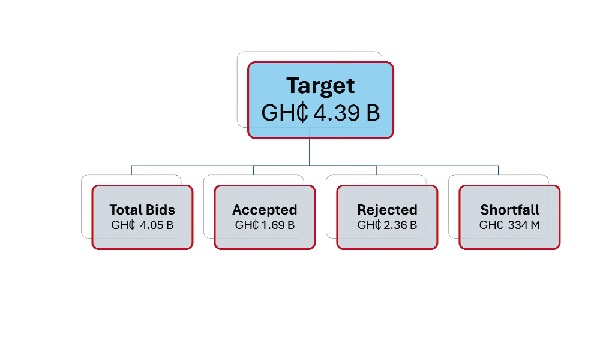In a shift that signifies the government's cautious approach to borrowing, a significant portion of bids totalling GH¢2.36 billion was rejected out of the GH¢4.05 billion bids tendered for the 91-day, 182-day, and 364-day bills auctioned on April 4, 2025.
The total bids received fell short of the government's target of GH¢4.39 billion by GH¢334 million, marking a continuation of undersubscription trends.
Despite this, the government accepted GH¢1.69 billion in bids, with the 91-day bill attracting the highest demand at GH¢3.38 billion, of which GH¢1.44 billion was accepted.
This is the third consecutive time in 2025 that the government has returned bids, signalling a potential shift in investor sentiment towards short-term government securities.
Analysts say this selective acceptance pattern suggests that the government is being cautious about the interest rates it is willing to pay.
However, this conservative stance may also be discouraging investors who are seeking better returns in a high-inflation environment.
The 182-day and 364-day bills recorded bids of GH¢ 501 million and GH¢176 million, respectively, with the government accepting GH¢ 81 million and GH¢ 161 million.
Yields on the 91-day bill declined by seven basis points to 15.64 per cent while the 182-day bill saw the highest decline of 23 basis points to 16.50 per cent.
The 364-day instrument declined by one basis point to 18.83 per cent.
This development comes as the government prepares to raise an additional GH¢ 6.67 billion at its next short-term debt sale scheduled for April 11, 2025.
Fiscal implications
The consistent underperformance of T-bill auctions poses significant challenges for fiscal planning. If the government continues to struggle in raising domestic funds, it may be compelled to explore alternative funding sources, which could be costlier.
This might involve reverting to commercial loans or expediting external borrowing, options that entail higher interest rates and increased exposure to exchange rate risks.
In the context of Ghana's ongoing IMF programme and the broader efforts towards fiscal consolidation, the government faces a delicate balancing act between maintaining borrowing discipline and addressing pressing expenditure needs.
The rejection of a significant portion of the bids suggests that the government remains cautious about borrowing costs despite ongoing financing needs.
The rejection of a significant portion of bids suggests that the government is prioritising fiscal discipline and prudent borrowing practices to manage debt levels and maintain macroeconomic stability.
However, this approach may also impact Ghana's ability to meet its financing needs and maintain investor confidence.
Investor fatigue
Analysts caution that persistently rejecting investor bids in an already weary market may lead to a sharp decline in investor confidence. If investors perceive the government as unwilling to offer competitive interest rates, they may opt out of future auctions or insist on higher returns to compensate for the perceived risk.
The outcome of the upcoming debt sale will be closely watched, as it may impact Ghana's ability to meet its financing needs and maintain investor confidence.
The government should closely monitor market sentiment and adjust its borrowing strategy accordingly. Maintaining fiscal discipline and prudent borrowing practices will be crucial in managing debt levels and ensuring macroeconomic stability.
Analysts want the government to prioritise maintaining investor confidence by ensuring transparency, predictability and stability in its economic policies.
Exploring alternative funding sources, such as foreign investors or domestic capital markets, may help reduce reliance on short-term debt instruments.
With investor interest dwindling and yields on the decline, the government is at a crossroads in managing its short-term debt.
Amidst a challenging economic landscape, finding the delicate balance between affordability and investor participation is crucial to maintaining stability and liquidity in the treasury market.
